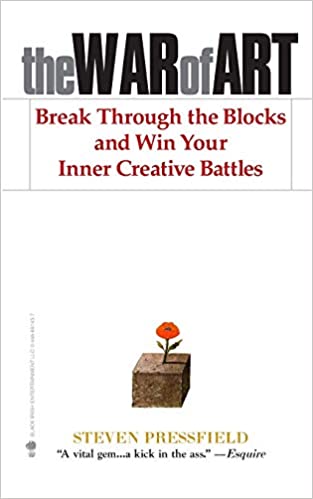Creativity is often dismissed. It’s viewed as a secondary subject in education and is sometimes shunned in certain fields.
Now more than ever, in our deeply analytical world, it’s believed that there is no place for it here. That’s not the truth.
Today, we’re going to discuss why being creative is especially important in our analytical world.

The War of Art
by Steven Pressfield
⏱ 12 minutes reading time
🎧 Audio version available
Creativity is one of the most important elements in the global economy, yet it’s not getting the credit it deserves, nor any recognition.
This mindset, believing that creativity has no place in our analytical, technical world, is toxic. It goes in hand with doing business. You cannot build a successful business empire, write code, create programs, and invent the next ingenious product without a little push.
Despite its importance, in most curriculums, creativity is not perceived as important as other subjects. That means that millions of students graduate school without knowing how to create, how to innovate, and thus, they’re not prepared for the oddball challenges that society and the economy throw in their paths.
Richard Florida, professor and head of the Martin Prosperity Institute at the Rotman School of Management at the University of Toronto, and a Distinguished Fellow at NYU’s School of Professional Studies, constantly talks about the growing importance of creativity. In his own words,
“I call the age we are entering the creative age because the key factor propelling us forward is the rise of creativity as the primary mover of our economy.”
What is this stigma around being creative in the cutthroat world of business and analytics?
People believe that those with creative minds are just daydreamers who aren’t capable of sitting down in the face of reality and being able to handle analytics.
This goes the other way as well. People believe that analysts are these robotic, emotionless, and logic-driven…well, robots who don’t have a shred of creativity they can pour into their paper and keyboards.
Thinking like this will influence your feelings about your work and your coworkers. It will affect how you work, who you hire, and even your personal relationships. It’s a good thing that the creative versus analytics argument is redundant. Analytics depends on creativity– and creativity depends on analysis.
There is an overlap between analytical work and creativity. And a narrow view on the two will just come in the way of the research needed to create anything of any significance.
When you think about marketing and advertising careers, then creative work is beyond crucial– and you’ll find that it’s also built on research. Marketing is driven by data. And employees have to test out each idea and results.
See how analytics come in?
And when it’s time to crunch the numbers and examine graphs, does creativity have a part? It sure does. Whenever someone forms an analysis, a hypothesis, they follow their intuition.
According to American astronomer, planetary scientist, cosmologist, astrophysicist, astrobiologist, author, poet, and science communicator Carl Sagan,
“It is the tension between creativity and skepticism that has produced the stunning and unexpected results of science.”
Science isn’t just endless sheets of data and information. It’s coming up with creative ideas and observations. All the legendary scientists we study about in school and admire? They possessed some of the most creative minds in history, capable of coming up with and testing the most creative hypotheses.
And when creativity and analysis don’t go hand in hand, you’ll find that they’re stages in a process. Depending on the situation and your line of work, you’ll need each one at a different time, but you can’t replace either.
Creativity in itself is described as the ability to imagine the world in new, different ways, find hidden patterns, connect unrelated subjects, and, most importantly, creativity is characterized by its ability to find solutions.
It’s not just painting over a canvass. Creativity is a two-part process: thinking and producing. It’s a “combinatorial force.” If you’re a creative person, you have the ability to access your mind’s bottomless pool of knowledge, inspiration, and insight.
It’s the process of breathing life into something new in the universe. And it requires incredible amounts of passion and commitment.
So does all of this have a place in our analytical world? Yes. It’s one of its fundamentals.
Take it from the CEO of IBM, Sam Palmisano. He said,
“Either you innovate, or you’re in commodity hell. If you do what everybody else does, you have a low-margin business. That’s not where we want to be.”
And no one lived in a more analytical world than Sam Palmisano. Under his innovative leadership, IBM started to reinvent itself to become a design company. They invested a staggering $100 million to hire designers and educate over 100,000 employees to be creative design thinkers. Over three years, IBM used this strategy to increase their profits by a whopping $18.6 million.
Despite all the evidence, a lot of people still dismiss creativity. In 2012, an Adobe study on creativity had some surprising results. Eight in ten people felt that unlocking creativity was critical to economic growth. Two-thirds of the participants felt like creativity was incredibly valuable to society.
And then, only one in four people felt like they were living up to their creative potential—just one.
In the past, marketing and advertising used to be solely about creativity and the message. Then, people realized that the medium was just as important and the message, so the age of media planning and investment started.
This then ushered in the age of digital advertising and targeting. Technology provides the tools for marketers to connect with consumers and develop compelling messages.
So creativity is amplified with data, which allows marketers to be more intentional and ensure that their clients are receiving the most relevant content possible.
Data is used to “harness the value of consumer engagement and ultimately provide insights and analytics.” Creative thinking, one that’s outside of the box, helps achieve business goals in the complex ecosystem between marketers and consumers across screens.
Let’s picture a world without creativity. The first thought that comes to mind is that it will be predictable and mechanical. To have a novel, compelling product, you need originality. And that won’t come true based on data and analytics alone.
This is what gives you a competitive edge. It adds value to your business, service, and product.
And you know what else creativity does? It frees your mind in a way that makes you more likely to absorb knowledge. That trait everyone dismissed as “daydreaming?” It’s making processing and learning more efficient.
It also unlocks new alternative ways of thinking, enables you to find patterns, and allows non-linear thinking. And most importantly, creativity breeds empathy in this analytical world.
Your ability to innovate and present creative solutions is becoming a requirement to reach personal and professional success in this wildly competitive world. According to Kenneth Robinson, one of the leading thinkers on creativity and a renowned author,
“Creativity is as important in education as literacy, and we should treat it with the same status.
Furthermore, creativity is basic to making our society viable because without we would lose our competitive edge.”
He found that our very existence– to some extent– depends on our ability to utilize creative intelligence. And until his death in August 2020, he tried to foster that creative intelligence and spread it throughout society.
Now, how can you spread creativity and prove its importance to others? The first thing that everyone must do is stop believing in the myth that creativity is just a talent that a few people possess. People aren’t born with wild imaginations and creative intelligence? It exists in all children, and parents are responsible for feeding it.
Creative intelligence allows our minds to create things that don’t exist in the present, things that we have never experienced. It also allows us to develop hypotheses, conjecture, speculate and see possibilities where there were none before.
Creativity allows us to utilize imagination and apply it to solve problems. This stereotype that only links creativity to certain fields and subjects such as advertising, design, and art– this is something that isn’t true.
No matter how much the world has evolved or turned analytical and mechanical, every aspect of our lives needs this. In today’s world, in this ever-changing global economy, we need creativity more than ever.
What Is Snapreads?

With the Snapreads app, you get the key insights from the best nonfiction books in minutes, not hours or days. Our experts transform these books into quick, memorable, easy-to-understand insights you can read when you have the time or listen to them on the go.


